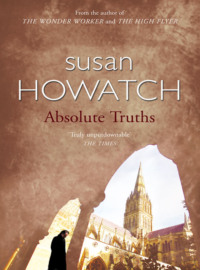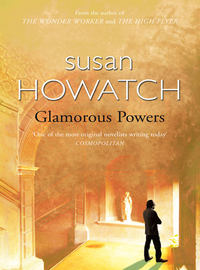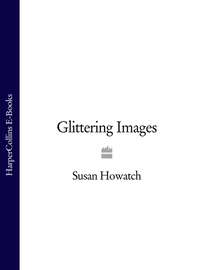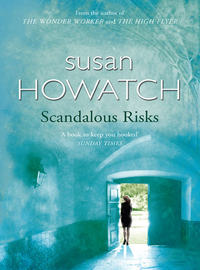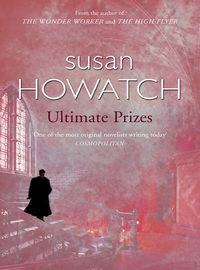
Полная версия
Mystical Paths
Anyway there I was, arriving hours late at Lady Markhampton’s house in the Close, and there was Marina, not just introducing me as the Coterie’s soothsayer-in-residence but even declaiming that I was the brother of Martin Darrow the actor (I’ll get to that creep Martin later). If there was one thing I hated even more than being paraded as a psychic, it was being paraded as the brother of the famous Martin Darrow – who was only my half-brother anyway, the son of my father’s first marriage, and so much older than I was that I felt he should be keeping little Gerald company in the hereafter.
It was before the drug era, so although everyone was stoned out of their minds the culprit was merely vintage Veuve Clicquot. I drank half a glass and asked for a Coke, just to be nasty. Marina gave a little tinkling laugh and said how original I was. Fortunately I discovered some excellent sausage rolls at the buffet. They kept me quiet for a bit. The nicest person in the room was my friend Venetia – Venetia Flaxton she was in those days. I’d met her a month earlier through Charley-the-Prig. It was curious how Charley Ashworth was present when I met both Marina and Venetia. The most unlikely people can turn up at crucial moments in one’s life.
Venetia seemed a lot older than I was then because in 1963 she was twenty-six and I was only twenty, but I always liked her. I specially liked her at Marina’s orgy that night. I could see she knew I hated being paraded as a soothsayer and the brother of Martin Darrow. ‘Give the poor child a chance to merge with the crowd!’ I heard her mutter exasperated to Marina, and the next moment she had swooped to my rescue by leading me to the most striking couple in the room.
The woman was dark, not one of my steamy brunettes but a romantic heroine who looked as if she had stepped out of some Victorian novel where women were idealised as angels – or perhaps out of some Victorian painting where the female figure was supposed to represent Purity in its endless battles against Lust. She had delicate features, pale skin and fine-boned, well-bred hands. I remember thinking: I wouldn’t want to go to bed with a woman like that because I’d be too afraid of breaking her.
The man who had apparently found this purity-on-a-pedestal fragility irresistible was lounging elegantly against the mantelshelf as if he owned not only the room but the house and the entire Cathedral Close. Tall, slim and dark, he coruscated with a glamour enhanced by an air of total self-confidence, the poise of a brilliant, sophisticated man who was well accustomed to the world grovelling at his feet. This aura of extreme worldly success fascinated me. I was also intrigued by the way the sensitivity of his face was marred by a thin, brutal mouth which had already, as if foreshadowing his middle age, begun to turn down slightly at the corners. I was surprised later when women sighed how handsome he was. That mouth ruined the film-star looks, but women, being women, obviously found it so sexy that they were incapable of seeing it as a blemish.
‘… and do you know the Aysgarths?’ Venetia was saying to me. ‘This is Christian – and this is his wife Katie …’
I had heard much about this couple over the years, but I had never before managed to meet them. Christian’s father was the Dean of Starbridge, the priest who ran the Cathedral. A self-made man, he had a considerable reputation as an administrator and no inhibitions about flaunting his powerful personality. My father disliked him but the Dean had many devoted friends and admirers not only in Starbridge itself but throughout the diocese. It was widely noted that the Bishop, like my father, was not among them.
In the early 1940s when my father had first met him, the Dean had been the Archdeacon of Starbridge, but in 1946 he had moved to London to become a canon of Westminster Abbey and an interval of eleven years had followed before he had returned to the diocese to take charge of the Cathedral. His eccentric second wife, Christian’s stepmother, invited me to a few parties at the Deanery because I happened to be only eighteen months younger than Christian’s brother Sandy, but when after one boring visit I consistently refused these invitations she at last gave up issuing them. I didn’t care for Sandy, whose idea of fun consisted of reading Greek poetry – in Greek – and the Dean’s other children were all either much older than I was or much younger.
Christian was fifteen years my senior, a fact which helps to explain why I had never met him before Marina’s Starbridge orgy; by the time his father returned to the diocese in 1957, Christian was a don up at Oxford, and once I had rejected his stepmother’s attempts to draw me into the Deanery’s junior social set, there was no reason why he should ever have encountered me. I did go to the Cathedral Close regularly to see the Ashworths, but since the Bishop and the Dean were constantly at loggerheads, contact between the Deanery and the South Canonry was minimal. Certainly on my visits to the Bishop’s house there was never an Aysgarth in sight.
Christian was the eldest child of the Dean’s first marriage. The second son, Norman, was a barrister who lectured in law; he was also at Marina’s orgy that night. There was a third son, James, whom at that time I had never met, a daughter, Primrose, whom I had glimpsed when Mrs Aysgarth had initially succeeded in dragging me to the Deanery, and finally my contemporary, Sandy-the-Greek-Freak, whose real name was Alexander. Elizabeth and Pip, Dean Aysgarth’s two offspring by his weird second wife, were still children at the time of Marina’s Starbridge party, and I knew little about them except that Pip was a pupil at the Cathedral Choir School and Elizabeth had been nicknamed Lolita by various ordinands at the Theological College.
‘Your father was the Principal of the Theological College back in the ’forties, wasn’t he?’ said Christian to me when we finally met that night. ‘I can remember him visiting us just before Father left Starbridge to take up the canonry at Westminster.’
‘Ah,’ I said, very young, very gauche.
‘And I remember Sandy telling me about you,’ pursued Christian. ‘“What’s the point of reading Homer,” you said to him, “when you could read Shakespeare instead?” Very shocking that was to Sandy! But I thought: there goes a man after my own xenophobic heart – a rampant chauvinist who goes to bed wrapped in the Union Jack every night!’
Everyone laughed as I tried to assemble a sentence which would prove I was no mental defective, but before I could speak, my friend Venetia exclaimed: ‘Stop teasing him, Christian! You don’t have to be xenophobic to prefer Shakespeare to Homer!’
‘No, but it helps.’ Suddenly he smiled at me and at once became the Oxford don who was well accustomed to socially inept undergraduates. ‘I seem to remember you’re reading divinity at the Other Place,’ he said kindly. ‘How are you getting on?’
‘Okay.’
‘I read theology up at Oxford, although my special subject is now medieval philosophy. Going to be ordained?’
‘Yep.’
‘Good for you. You’re a braver man than I ever was.’
‘Darling!’ said his wife reproachfully. ‘You can’t imply you’re lacking in courage just because you weren’t called to be a clergyman!’
‘The Devil only knows what I was called to be,’ said Christian, turning his back on her, and at once I was aware of tension, of darkness, of a tingling on the spine.
Marina surged past me into the middle of the group. ‘Christian, did I ever tell you I met Nicky when I was lying semi-nude in a punt on the Cam?’
‘I should think you met a lot of people, my love, if you lay around semi-nude in a punt on the Cam.’ He raised his voice to address a man who had begun to drift towards us from a group by the window. ‘Perry, come and meet the bravest man in this room – Marina’s soothsayer’s heading for a cassock and dog-collar!’ And to me he added: ‘Nick, this is Peregrine Palmer, a very old friend of mine.’
‘Hullo, Nick,’ said Palmer. ‘Nice to meet someone under twenty-five who’s committed to Jesus Christ instead of that crashing bore Elvis Presley.’
‘I’m mad about Elvis!’ cried my friend Venetia hotly.
‘I’m mad about you,’ said Palmer, ‘and how you could enjoy that kind of moronic music is quite beyond my power to imagine …’
An argument followed about whether rock –’n’-roll had replaced religion as the opium of the masses. I wanted to talk to Christian but still I was unable to devise a remark worthy of his attention. Meanwhile Christian himself continued to lounge against the chimney-piece, his glass of champagne in one hand, a cigarette in the other, and his wife continued to gaze at him adoringly. So did Marina. That was when I realised that the secret hero-worship of last summer had blossomed into a passion which I had no doubt was platonic. Katie obviously had no doubt either. She was quite at ease, and when Marina offered her a cigarette she accepted it with a smile. By this time the debate had progressed from a disagreement about Marx’s ‘opium of the masses’ to a slanging match about Sartre’s brand of existentialism, and I couldn’t help admiring Venetia. Refusing to conform to the conventional pattern of feminine behaviour, she spoke up to both men, remained unintimidated when Palmer tried to undermine her argument and finally won the debate by shouting out a quotation in Latin.
‘Phew!’ gasped Palmer pie-eyed.
I couldn’t make up my mind whether he liked Venetia as much as he appeared to like her, or whether the friendly admiration was just an act, part of an adroit social manner which could be switched on and off without effort. There was something unreadable about Palmer. He had brown hair, neatly cut and parted, bland blue eyes and a square, unremarkable face which any poker-player would have envied; he economised constantly in his use of facial muscles. He was shorter than Christian. I remember noticing, as I glanced in the glass above the fireplace, that Christian and I were the same height: six feet exactly.
The party blazed on. Having reviewed my limited knowledge of Christian’s special subject, I finally managed to compose a sentence suitable for opening a conversation with him (‘Could the work of Joachim of Flora be considered a forerunner of the Marxian view of history?’) but unfortunately I never managed to ask this mind-bending question because I was collared by Michael Ashworth. He wasn’t engaged to Marina in those days and was busy being girl-mad, reacting against his father, the strait-laced bishop, and his brother, Charley-the-Prig. I had been watching him as I devised my question about Joachim of Flora. He had been sprawled on the sofa with two girls, his right arm squeezing the waist of the blonde (Emma-Louise) while his left hand squeezed the breast of the brunette. This unknown brunette interested me deeply. She was an ultra-steamy concoction of heaving cleavage, lissom legs and smouldering dark eyes.
‘This is Dinkie,’ said Michael, having nobly abandoned his squeezing in order to look after me. Although nearly three years my senior he always took a benevolent interest in my welfare.
‘Hiya, gorgeous,’ said the steamy brunette in a show-stopping American drawl.
‘Hi.’ Of course I could think of nothing else to say. What hell it is to be young.
‘I just love to make passes,’ said this fabulous creature, ‘at guys who wear glasses.’
This indeed was an education. I had lost my virginity a month after my encounter with Marina the previous summer, but I still knew very little about girls and I still thought my reflection in the mirror fell far short of the masculine ideal which would be demanded by any discerning steamy brunette. I was glad to be tall but I hated being so lanky and angular. I was glad not to be blind but I hated having to wear glasses. I was glad to be white, since life in England was such hell for blacks, but I hated the unusual pallor of my skin. I was glad not to be a hermaphrodite but I hated being so unremarkable below the waist. Since the loss of my virginity I had accepted that average-sized genitals were quite sufficient to see me through life, but nevertheless I remained discontented because I had hoped to be compensated for my plain looks by being supremely well-endowed sexually. (What hell it is to be young.) No wonder I was so tempted to rely for sex-appeal not on my physique but on my psyche. It was all very well for my father to drone on about those ‘glamorous powers’ which could be so easily purloined by the Devil, but at the insecure age of twenty it was hard to resist parading all the glamour at my disposal once a steamy brunette appeared on the horizon.
‘A soothsayer, huh?’ purred Dinkie Kauffman at Marina’s party that night. Tell my fortune, Wonder-Cat, and be sure you make it cool!’
But before I could begin to produce the usual intuitive rubbish, Christian clapped his hands to gain everyone’s attention and I realised that the climax of the party had been reached. The lights were switched off, the curtains pulled back and as the floodlit Cathedral was revealed beyond the window, Christian proposed a toast to Starbridge. I had long since finished my Coke but I thought I might eat, rather than drink, the toast so I sidled to the buffet under cover of darkness and grabbed another of the sausage rolls. As I did so Dinkie suggested that we should all dance on the Cathedral roof and for some reason everyone seemed to think this was a brilliant idea. Funny the whims people get when they’re drunk. But maybe the concept of polluting a numinous place by idiotic behaviour just has no meaning for non-psychics. For me it would have been like throwing paint at the Mona Lisa.
Deciding it was time to leave I stuffed the last two sausage rolls into my pocket to keep me happy on the journey home, but unfortunately the lights were turned on again before I could complete this manoeuvre and my friend Venetia saw the second roll vanish. Immediately I felt embarrassed by my brazen greed, but almost before I had time to register her smile of sympathy my embarrassment was wiped out as the horror began.
The power was switched on in my psyche.
Knowledge began to be hammered directly into my brain, but this wasn’t just a brief rattle of the computer keyboard followed by a quick flash on the blank screen. This was the long slam which seemed as if it would never end, this was the keyboard pounding so fast that the keys were no more than a blur to the psychic eye, this was the big print-out which cascaded all over my mind.
The shock was so profound that I almost lost consciousness. I could neither move nor speak. I could barely breathe.
The Dark began to pour into the room.
III
Sometimes foreknowledge is known as ‘second sight’, but when I suffered such attacks they were never visual. In that respect I was less gifted than my father. As a psychic I experienced two kinds of special knowledge: one was the quick flash which could sometimes be written off as intuition; the other, much rarer, was the long slam which bore no more resemblance to intuition than an elephant bears to a mouse. Such episodes had a peculiarly vile, lucid quality which, unlike intuition, seemed to leave no room for ambiguity. This instant, uncontrollable destruction of all the shadows we depend on to shield us from searing truths was horrific. No wonder I nearly passed out with shock. It was as if I’d been sitting in an armchair by a cosy fireside and had been brutally blasted into Belsen.
Many people think it must be fun to be a psychic. Fun! When as a small child I first experienced the long slam I screamed non-stop until my father arrived to stitch up my shredded little psyche. Fortunately my mother was out at the estate office, but poor Nanny thought I’d gone mad. My father held me in his arms for a long time but eventually he slipped his pectoral cross into my hand and told me I was safe.
‘No demon can withstand the power of Christ,’ he said, and when he spoke the name of the greatest exorcist who had ever lived, the image of the Light captured my brain and the Dark was conquered.
Much later in my life I read about autistic children. What interested me was that some doctors believed these children could be helped by being held tightly for long periods by a loving adult. I was never autistic; nor were all my profound psychic experiences equally terrifying. But they could be horrific enough to produce a reaction akin to mental illness, and never, by any stretch of the imagination, could they be described as ‘fun’.
As soon as the Dark began to pour into the room that night at Marina’s party, I was not only physically immobilised but mentally booted on to a plane not normally accessible to the conscious mind. I looked around the room and all the objects in it seemed to be hammering out messages to me, they were all speaking, although of course there were no words, no sounds, but I stood in that room, Lady Markhampton’s drawing-room it was, the drawing-room of that house called the Chantry which stood in the Cathedral Close, and because all the objects there were vibrating with information I experienced her essence quite clearly; the image was slapped on the computer screen of my psychic eye. That meant I could ‘see’ her – but psychically, not visually – and at once I thought: nice old girl, sharp tongue, kind heart, well read, cleverer than her husband – and then I experienced the husband’s essence too: old buffer, drank too much, liked cricket and Havana cigars, stupid old bore, forget him, and anyway the love of Lady Markhampton’s life hadn’t been her husband, it had been a slim, striking, middle-aged man with golden eyes – golden eyes just like Charley Ashworth’s, how odd – and he was wearing a frock-coat and gaiters, a fact which was odder still, but no, he wasn’t an actor in a costume melodrama, he was a twentieth-century bishop in full episcopal gear, interesting, fancy Lady Markhampton being in love with a bishop, but of course she’d kept her secret, and neither the bishop nor the silly old husband had ever guessed.
Then time suddenly went way out of alignment, and I knew that in that drawing-room, so civilised and elegant, a priest had been killed during the Civil War when the Roundheads had smashed up Royalist Starbridge. There was wall-to-wall blood, I couldn’t see it, but it was there, I was wading in it, and all at once the Force – the psychic force – roared into top gear, like a gale it was, no, a hurricane, no, a nuclear wind, and it nearly deafened me, although of course there was no sound, just print-out, print-out, print-out, slam, slam, slam on the computer keyboard, and the word which kept flashing on the screen was DEATH, DEATH, DEATH, DEATH, DEATH.
Then I looked at my companions, that jeunesse dorée, those glamorous friends of Marina Markhampton all glittering in the Light, and I knew the Dark was closing in on them, I knew the Coterie was doomed. But Michael Ashworth was going to survive – odd how sure I was of that when popular opinion wrote him off as a rake who could only go from bad to worse, but no, Michael was going to live and someone else was going to live too, one of the girls – was it Marina, surviving with Michael? – but I couldn’t quite read the name in the print-out – oh God, let it be my friend Venetia! – and meanwhile the keys were slamming on and the horrors were coming up brilliantly lit upon the screen.
I looked at Dinkie, the steamy brunette, and knew she’d become a walking corpse. I looked at Christian’s brother Norman and knew his body would rot long before he died. I looked at Norman’s wife Cynthia and heard her screaming in a locked room. I looked at Marina’s friend Holly Carr and felt the pain as she slashed her wrists. I looked at Katie Aysgarth’s brother Simon and knew the waters would close over his head. I looked at my friend Venetia and the word that roared through my brain was DANGER, DANGER, DANGER – and I thought: I’ve got to save her, got to act, got to speak –
But when I stepped forward Marina intercepted me. ‘Nicky – Nicky! You’re not listening – what’s the matter, have you gone deaf? I want you to tell all our fortunes once we get up to the Cathedral roof …’
I said something, don’t know what, anything to brush her off, and then, thank God, Venetia saw me. She was on the other side of the room. I began to stagger towards her, and I think she realised I had a message to deliver because she came to meet me, but when we were face to face at last I was tongue-tied. I found I had no way of imparting my psychic knowledge; the ‘gnosis’ wasn’t transmissible to that part of the brain which controls speech, and when I finally opened my mouth the only words that came out were: ‘Don’t go to the Cathedral.’
Venetia’s expression changed from curiosity to an amused indulgence. What a dear little psychic poodle, she was thinking, a nonsensical warning delivered with such an earnest expression, he really is rather adorable.
Overcome by an embarrassed fury I bolted into the hall.
Someone – something – the cosmic equivalent of a hand – switched off the Force.
I just managed to reach the cloakroom basin before I threw up. Then I dashed cold water on my face and willed myself to stop shaking. I was wearing no cross but I tried to roll back the Dark by silently reciting the old Orthodox prayer which I used as a mantra. Lord Jesus Christ, Son of God, have mercy on me, a sinner, Lord Jesus Christ, Son of God, have mercy on me, a sinner, Lord Jesus Christ, Son of God –
Someone rattled the cloakroom door. ‘Yoo-hoo! Who’s monopolising the lavatory? Hurry up!’
Struggling out I found Marina giggling with her girlfriends, Holly and Emma-Louise.
‘Nicky, do change your mind about coming to the Cathedral!’
Incapable of speech I merely shook my head, hurtled across the hall to the dining-room, which had been set aside for the guests’ coats, and began to rummage around for my leather jacket.
‘Ah, there you are!’ said Christian, walking into the room a second later. ‘I was afraid you’d already gone. This hasn’t been much fun for you, has it? Marina’s very bold in bringing together widely differing age-groups, but it’s a risky strategy for a hostess to adopt.’
‘I didn’t mind.’ I pawed at a mink stole and finally found my jacket. ‘It was okay.’
‘Was it? You look a bit green.’
Too many sausage rolls –’
‘– and not enough champagne!’ he said laughing. To my surprise he added: ‘Look, I’m sorry I didn’t have much chance to talk to you – I think you were probably the most original person in the room and I always admire originality. Come to Oxford to see me if ever you can tear yourself away from the Other Place!’
And then as he smiled straight into my eyes, the Force blasted back across my psyche and I thought: you’ll die young.
THREE
‘We sin because we are part of a sinful situation …’
MICHAEL RAMSEY
Archbishop of Canterbury 1961–1974
Canterbury Pilgrim
I
He died two years later in the summer of 1965. I met him only three times after that first encounter, but those meetings ensured I became involved in the mystery of 1968. They all took place within weeks of Marina’s party.
I was anxious to respond to his invitation to Oxford, so as soon as my second-year exams were finished I wrote him a note which read: ‘Dear Dr Aysgarth, If you have a moment to spare I’d like to ask you how far Joachim of Flora’s philosophy predates Karl Marx’s theory of history. I could come up to Oxford any time now. Yours sincerely, N. DARROW.’
In reply he wrote back: ‘Dear Nick, How nice to hear from you! Now that term’s ended and my undergraduates have finished having nervous breakdowns, I’m free as air. Come up for the weekend and we’ll pull Joachim to pieces! Yours, CHRISTIAN.’
I went up for the weekend. He had an unexpectedly large house in North Oxford, a fact which reminded me that Katie came from a wealthy family. There was a tousled garden with a bumpy tennis court in the middle of it. The house was comfortable, but its youngest inhabitants, two little Aysgarths aged five and two, ensured that it was not oppressively tidy. I knew little about children in those days, but these girls seemed unusually bright and well-behaved. An au pair female pitter-pattered in the background but Katie did most of the cooking herself. The food was Frenchified but plentiful. I ate voraciously and remembered to offer to help with the washing up. Katie said no, no, but was pleased I had volunteered. Christian said no, no, and bore me off to his study for mind-stretching conversations about Joachim of Flora, but since people kept dropping in and the phone kept ringing, our discussions tended to be fragmentary.


